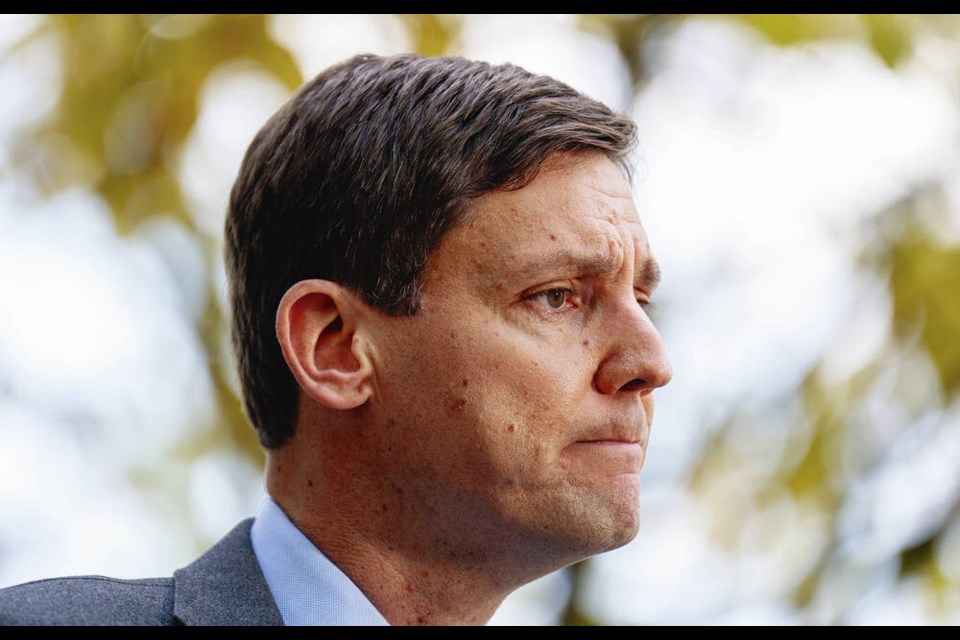VANCOUVER — Supporters of British Columbia’s next premier admire it, while his rivals are wary of it.
Both agree that David Eby’s brain is not to be taken lightly.
Eby has developed a reputation for tackling some of the most complex and contentious portfolios on the B.C. government’s plate while in cabinet and bringing fierce arguments to the table against his opponents.
Soon, he’ll test that experience as the province’s leader at a time of overlapping crises in health care, housing, public safety and climate disasters.
“He takes on big challenges and delivers, and I have full confidence that that’s what he’ll do when he goes forward,” said Ravi Kahlon, minister of jobs, economic recovery and innovation.
Eby became the leader of the B.C. New Democratic Party Friday, paving the way for his swearing-in as premier at a date that has yet to be determined.
He will replace John Horgan, who announced in June he would be stepping down after defeating cancer for the second time and saying it left him with little energy for the job he loved.
Eby was first elected to the legislature to represent the affluent neighbourhood of Vancouver-Point Grey in 2013, when he defeated Christy Clark, a giant-killing feat that forced Clark to seek a seat in a Kelowna byelection.
After gaining attention as a passionate critic in Opposition, he joined cabinet when the NDP took power in 2017. Some of his files as attorney general and minister responsible for housing have included a crackdown on money laundering, driving debate for housing policy reforms and revamping the cash-strapped Crown-owned Insurance Corporation of B.C., which he memorably labelled a “dumpster fire.”
He also ushered in the establishment of a Human Rights Commissioner for B.C.
Kahlon described Eby as a “natural leader” in cabinet and committee who is thoughtful and caring.
“You can see that he’s actively listening. You often can see him shift his position, if he hears good arguments. Those are signs of good leadership,” said Kahlon, who was Eby’s leadership campaign co-chairman.
Before entering politics, Eby worked as a human rights lawyer specializing in constitutional and administrative law. He worked as an adjunct law professor at the University of B.C. and led the B.C. Civil Liberties Association, where he authored The Arrest Handbook, a guide on what to expect from police and how to act if you’re arrested.
He told a news conference Friday that his work with Pivot Legal Society as an advocate for people living on Vancouver’s Downtown Eastside was formative.
“It was very clear to people in that neighbourhood if I was acting in their interests in delivering for them or not because if I did, they kept their home, the didn’t become homeless. But if I didn’t, then their life wasn’t better and they weren’t sure why we were talking,” Eby said.
That work taught him the importance of focusing on listening to community members and paying attention to what their priorities are instead of his own, he said.
“If I wasn’t doing that, then I wasn’t doing my job. That is what it is all about for me and that remains true in government.”
Katrina Chen, minister of state for child care, said Eby has played an encouraging role since she joined government, suggesting to her that she had an important perspective to contribute as an immigrant from Taiwan, single mother and someone who learned English as a second language.
“There were times that he’ll ask for my feedback on issues, even on things like housing where he is an expert,” Chen said, adding he seemed interested in looking at the issue from a multicultural lens.
She would give him her honest input about how a policy might affect her, and he would take that seriously, she said.
Sitting across the aisle in the legislature from Eby has demanded a certain level of alertness.
“When you’re dealing with someone as clever and intelligent and partisan as David Eby, you’d better be prepared,” said BC Liberal Mike de Jong, who served as Eby’s critic on the attorney general file before he left his cabinet duties.
De Jong, a former finance minister, was also regularly questioned by Eby when the Liberals were in power.
On a personal level, he described their relationship as “cordial and professional.’
However, the pair have exchanged jabs over the years and de Jong took a more skeptical view of Eby’s approach to politics, describing him as an “ultra-partisan political combatant.”
By that, de Jong clarified, he meant Eby could be “very accusatorial, very dismissive of opponents.”
“For example, David Eby’s assertion that his political opponents simply didn’t care is incorrect,” de Jong said.
He said when Horgan announced he would leave his role, there wasn’t much surprise within the Liberal caucus when Eby quickly emerged as the frontrunner to succeed him.
“When our roles were reversed and I was in government and he was in Opposition, I once teased him about being the dauphin, the chosen one to succeed,” de Jong said, referring to the historical French term for the heir to the throne.
“I think I said that seven years ago. It turns out he was more of the chosen one than even I thought. So the dauphin has now taken his place.”
>>> To comment on this article, write a letter to the editor: [email protected]



